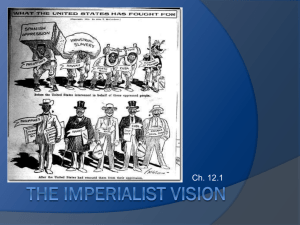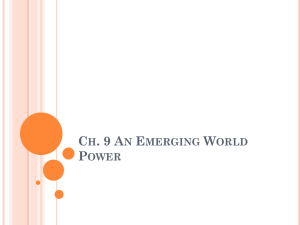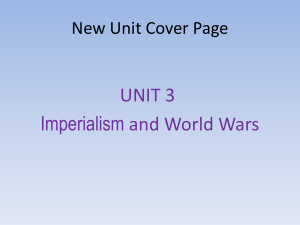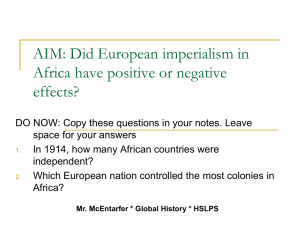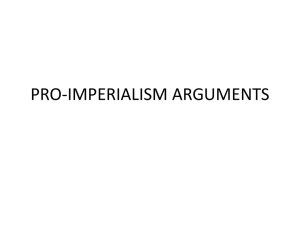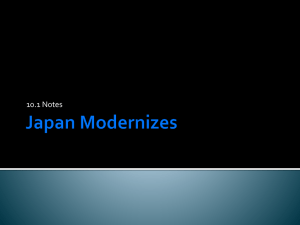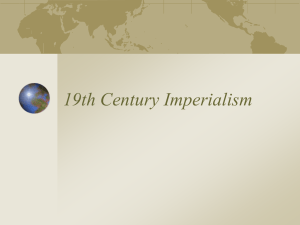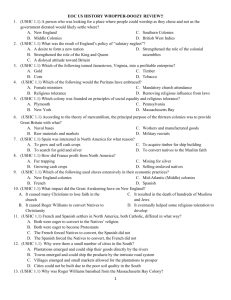imperialism - Gracie Magyar
advertisement
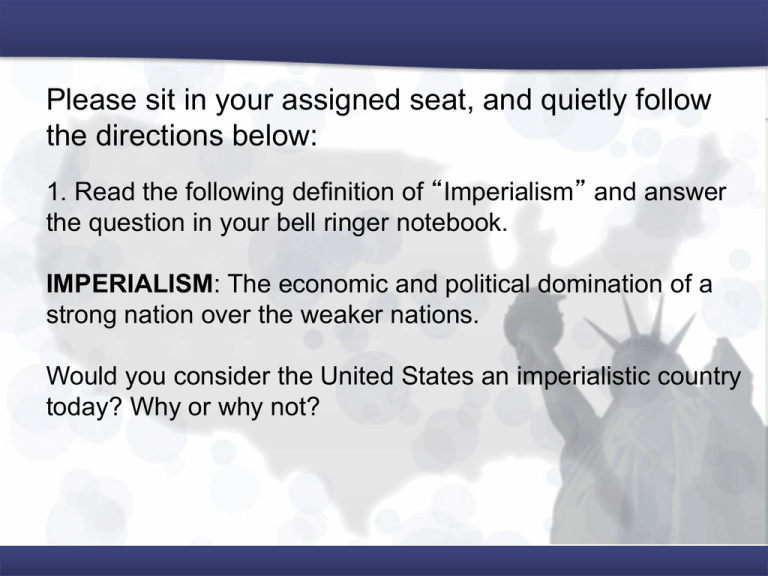
Please sit in your assigned seat, and quietly follow the directions below: 1. Read the following definition of “Imperialism” and answer the question in your bell ringer notebook. IMPERIALISM: The economic and political domination of a strong nation over the weaker nations. Would you consider the United States an imperialistic country today? Why or why not? USHC Standard 5: The student will demonstrate an understanding of domestic and foreign developments that contributed to the emergence of the United States as a world power in the twentieth century. USHC 5.1: Analyze the development of American expansionism, including the change from isolationism to intervention and the rationales for imperialism based on Social Darwinism, expanding capitalism, and domestic tensions. Since the Washington administration, the United States steered clear of “entangling alliances”, as President Washington had warned in his Farwell Address. The U.S. avoided these alliances because of the predominance of domestic interests and the United States’ limited military power. Similarly, directly following the Civil War, most Americans showed little interest in expanding their nation’s territory and international influence. MAIN IDEA: In the late 1880’s, this view began to shift, and more Americans were interested in making the United States a world power. This shift occurred for two reasons: 1.There was economic and military competition from other nations. 2.There was a growing feeling of cultural superiority in America. IMPERIALISM The economic and political domination of a strong nation over other weaker nations. Reasons for European Imperialism: 1.Their factories depended on raw materials from all over the world. 2.By the late 1800’s, most industrialized countries (European countries) had placed high tariffs, or taxes, against each other. a. This made it difficult and pricey for European countries to trade with each other. 3.The growth of investment opportunities in western Europe had slowed. 4.European investors, or business men, needed new industries to invest in 5.They began investing particularly in Africa and Asia European countries wanted to protect their investment, so they exerted control over the areas of interest by creating colonies and protectorates. COLONY: Any people or territory separated from but subject to a ruling power. PROTECTORATE: The imperial power allowed the local rulers to stay in control and protected them against rebellion and invasion. As the United States industrialized, many Americans took interest in the idea of imperialism. What is industrialization? Economy dominated by industry due to technological advancement in society Why would industrialization lead to an interest in imperialism? Industrialization leads to a need for more/new raw materials, or natural resources, and a need for raw materials leads to imperialism Americans also became interested in imperialism because of a growing feeling of cultural superiority. Many Americans felt that the pioneer spirit of the early settlers was what made the U.S. great. Frederick Jackson Turner, a famous historian, gave a famous speech in 1893, appealing to nationalism and a new Manifest Destiny. NATIONALISM: pride in one’s nation MANIFEST DESTINY: the responsibility of whites in the U.S. to civilize and bring democracy to the unsettled west of North America Americans believed it was also the United States’ destiny to civilize and bring democracy to the rest of the world. Social Darwinism: nations competed with each other politically, economically, and militarily, and that only the strongest would survive. Many Americans, such as writer and historian John Fiske, took the idea further, believing that English speaking nations had superior character, ideas, and systems of government, and were destined to dominate the planet. This was known as Anglo-Saxonism. Americans began expanding their nation by looking west in the early days of the Republic, so when they began looking to expand overseas, they looked west, toward the Pacific. Expansions in the Pacific: 1. Japan: President Franklin Pierce and Commodore Matthew C. Perry forced Japan to open trade to the U.S. in 1852 2. Hawaii: The U.S. annexed Hawaii after sugar plantation owners overthrew the Queen of Hawaii, Queen Liliuokalani, with the help of U.S. marines. 3. Latin America: The U.S. extended its influence in Latin America through the Organization of American States, in order to create cooperation among the nations in the Western Hemisphere. Also, the U.S. wanted Europe to know they were the dominate nation in the Western Hemisphere. As both the American people and their government became more willing to risk war in defense of American interests overseas, support for building a large modern navy began to grow. Why did Congress ultimately decide to authorize construction of a modern American navy? 1. Business leaders wanted new markets overseas. 2. Many Americans were convinced it was America’s destiny to dominate the world. 3. Growing European imperialism threatened America’s security. Critical Thinking Questions 1. 2. 3. 4. 5. How does the overthrow of Queen Liliuokalani and the annexation of Hawaii illustrate the U.S. movement from isolationism to imperialism in the late 19th century? How did the decision to annex Hawaii most likely change the way other foreign nations looked at the U.S.? Why? Explain Social Darwinism in your own words. Do you agree with the theory? Why/why not? Give 1 example of the truth of the Social Darwinist theory in the U.S. today. Explain imperialism in your own words. Give the two reasons for the shift from isolationism to imperialism, then decide if you think they are justified (are they reasonable? Do you understand them?) or not. Do you think imperialism is justified and necessary or power hungry and cruel? Why/why not? Give 1 example of imperialism in the U.S. today. Give three reasons you think the U.S. chose to expand in the Pacific Ocean. (Think critically and be creative!) EOC Questions 2) Queen Liliuokalani attempted to rid her people of American influence in the late 1800s. Where did she rule? A) Alaska B) Cuba C) Hawaii D) Philippines EOC Questions 8) This territory was annexed by the United States in 1898, five years after planters there overthrew the leader and requested the US to annex the territory. A) Cuba B) Guam C) Hawaii D) Philippines EOC Questions 5) What is the MOST accurate Social-Darwinist defense for U.S. imperialism? A) Robber Barons deserved new markets to sell their goods and expand their businesses. B) Nations that considered themselves superior felt obliged to govern less-advanced nations. C) The United States needed to test its military strength to make any necessary improvements. D) The United States needed to compete with European nations to prove that the United States was superior. EOC Questions 4) The United States' acquisition of the Philippines, Puerto Rico, and Hawaii are all examples of late-nineteenth century A) imperialism. B) isolation. C) populism. D) trade. EOC Questions 5) On what geographical area did the US concentrate in order to expand its influence during the late 1800s and early 1900s? A) West America B) Western Europe C) the Indian Ocean D) the Caribbean Sea
